Nursing Principles: Managing Older Adults in Aged Care Settings
VerifiedAdded on 2023/06/11
|9
|2737
|500
Essay
AI Summary
This essay critically analyzes the principles of nursing management for older people requiring aged care, emphasizing the importance of gerontological nursing in meeting the multidisciplinary health needs of an aging population. It reviews literature from journals, books, and regulatory organizations, highlighting the role of the Australian Association of Gerontology (AAG) and its nursing special interest group (AAGNSIG) in promoting specialized nursing knowledge. The essay discusses key principles such as evidence-based practice, holistic care, fairness, respect, and collaboration, and how these principles guide the planning, organizing, and control of activities in aged care centers. It also reflects on how the knowledge gained from the study can enhance decision-making, improve interactions with older adults, and promote professional development in the workplace, advocating for continuous research and the application of best practices in delivering evidence-based care.

NAME:
DATE:
UNIT:
DATE:
UNIT:
Paraphrase This Document
Need a fresh take? Get an instant paraphrase of this document with our AI Paraphraser
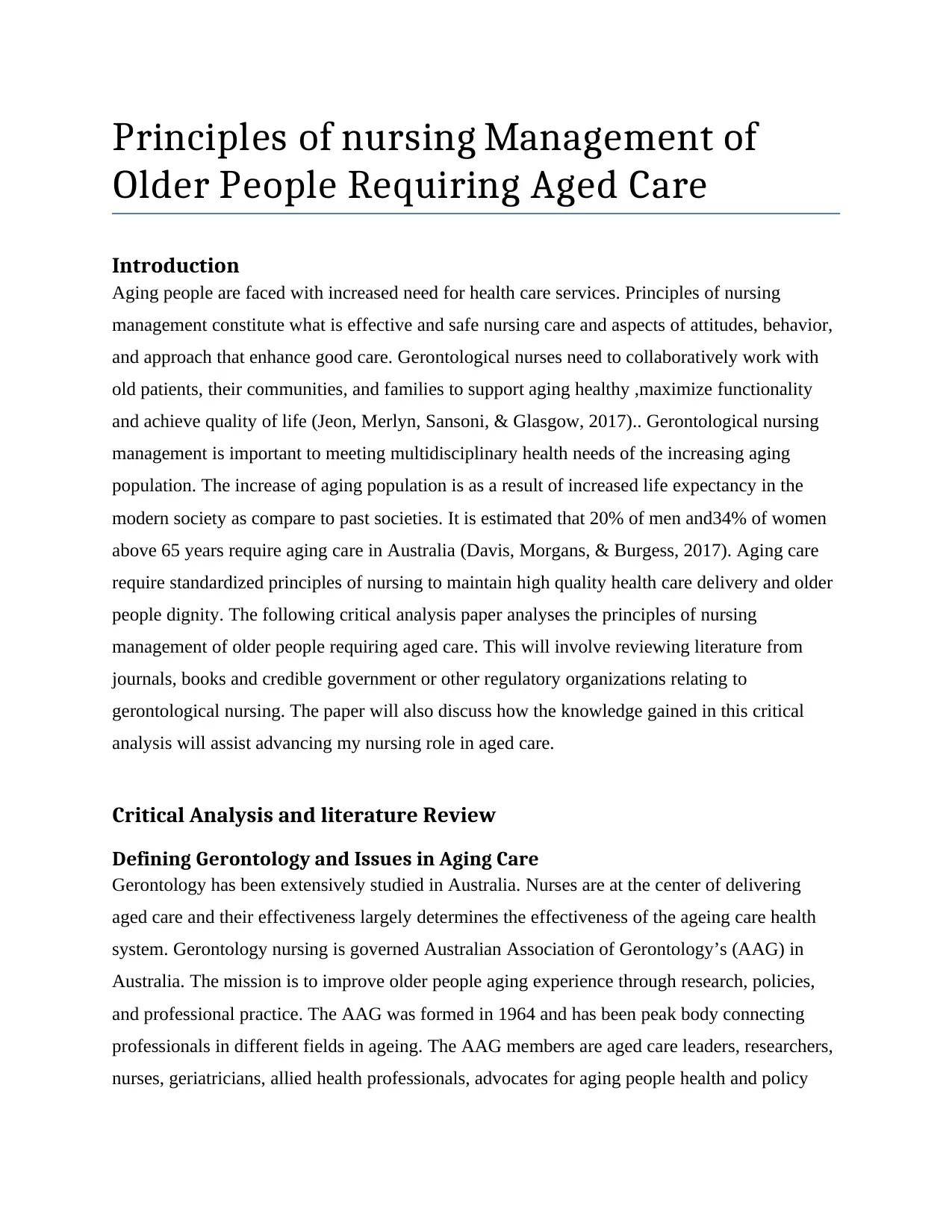
Principles of nursing Management of
Older People Requiring Aged Care
Introduction
Aging people are faced with increased need for health care services. Principles of nursing
management constitute what is effective and safe nursing care and aspects of attitudes, behavior,
and approach that enhance good care. Gerontological nurses need to collaboratively work with
old patients, their communities, and families to support aging healthy ,maximize functionality
and achieve quality of life (Jeon, Merlyn, Sansoni, & Glasgow, 2017).. Gerontological nursing
management is important to meeting multidisciplinary health needs of the increasing aging
population. The increase of aging population is as a result of increased life expectancy in the
modern society as compare to past societies. It is estimated that 20% of men and34% of women
above 65 years require aging care in Australia (Davis, Morgans, & Burgess, 2017). Aging care
require standardized principles of nursing to maintain high quality health care delivery and older
people dignity. The following critical analysis paper analyses the principles of nursing
management of older people requiring aged care. This will involve reviewing literature from
journals, books and credible government or other regulatory organizations relating to
gerontological nursing. The paper will also discuss how the knowledge gained in this critical
analysis will assist advancing my nursing role in aged care.
Critical Analysis and literature Review
Defining Gerontology and Issues in Aging Care
Gerontology has been extensively studied in Australia. Nurses are at the center of delivering
aged care and their effectiveness largely determines the effectiveness of the ageing care health
system. Gerontology nursing is governed Australian Association of Gerontology’s (AAG) in
Australia. The mission is to improve older people aging experience through research, policies,
and professional practice. The AAG was formed in 1964 and has been peak body connecting
professionals in different fields in ageing. The AAG members are aged care leaders, researchers,
nurses, geriatricians, allied health professionals, advocates for aging people health and policy
Older People Requiring Aged Care
Introduction
Aging people are faced with increased need for health care services. Principles of nursing
management constitute what is effective and safe nursing care and aspects of attitudes, behavior,
and approach that enhance good care. Gerontological nurses need to collaboratively work with
old patients, their communities, and families to support aging healthy ,maximize functionality
and achieve quality of life (Jeon, Merlyn, Sansoni, & Glasgow, 2017).. Gerontological nursing
management is important to meeting multidisciplinary health needs of the increasing aging
population. The increase of aging population is as a result of increased life expectancy in the
modern society as compare to past societies. It is estimated that 20% of men and34% of women
above 65 years require aging care in Australia (Davis, Morgans, & Burgess, 2017). Aging care
require standardized principles of nursing to maintain high quality health care delivery and older
people dignity. The following critical analysis paper analyses the principles of nursing
management of older people requiring aged care. This will involve reviewing literature from
journals, books and credible government or other regulatory organizations relating to
gerontological nursing. The paper will also discuss how the knowledge gained in this critical
analysis will assist advancing my nursing role in aged care.
Critical Analysis and literature Review
Defining Gerontology and Issues in Aging Care
Gerontology has been extensively studied in Australia. Nurses are at the center of delivering
aged care and their effectiveness largely determines the effectiveness of the ageing care health
system. Gerontology nursing is governed Australian Association of Gerontology’s (AAG) in
Australia. The mission is to improve older people aging experience through research, policies,
and professional practice. The AAG was formed in 1964 and has been peak body connecting
professionals in different fields in ageing. The AAG members are aged care leaders, researchers,
nurses, geriatricians, allied health professionals, advocates for aging people health and policy
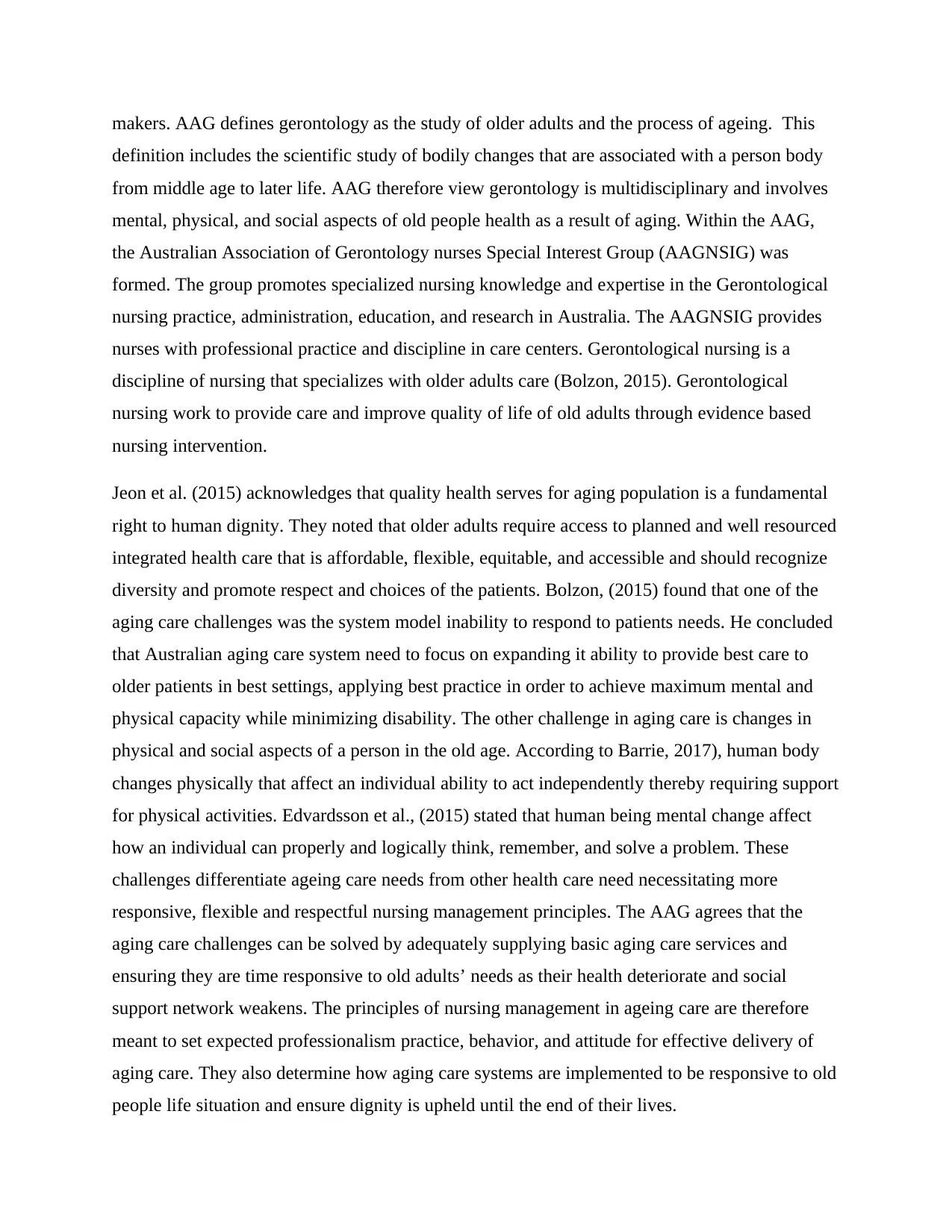
makers. AAG defines gerontology as the study of older adults and the process of ageing. This
definition includes the scientific study of bodily changes that are associated with a person body
from middle age to later life. AAG therefore view gerontology is multidisciplinary and involves
mental, physical, and social aspects of old people health as a result of aging. Within the AAG,
the Australian Association of Gerontology nurses Special Interest Group (AAGNSIG) was
formed. The group promotes specialized nursing knowledge and expertise in the Gerontological
nursing practice, administration, education, and research in Australia. The AAGNSIG provides
nurses with professional practice and discipline in care centers. Gerontological nursing is a
discipline of nursing that specializes with older adults care (Bolzon, 2015). Gerontological
nursing work to provide care and improve quality of life of old adults through evidence based
nursing intervention.
Jeon et al. (2015) acknowledges that quality health serves for aging population is a fundamental
right to human dignity. They noted that older adults require access to planned and well resourced
integrated health care that is affordable, flexible, equitable, and accessible and should recognize
diversity and promote respect and choices of the patients. Bolzon, (2015) found that one of the
aging care challenges was the system model inability to respond to patients needs. He concluded
that Australian aging care system need to focus on expanding it ability to provide best care to
older patients in best settings, applying best practice in order to achieve maximum mental and
physical capacity while minimizing disability. The other challenge in aging care is changes in
physical and social aspects of a person in the old age. According to Barrie, 2017), human body
changes physically that affect an individual ability to act independently thereby requiring support
for physical activities. Edvardsson et al., (2015) stated that human being mental change affect
how an individual can properly and logically think, remember, and solve a problem. These
challenges differentiate ageing care needs from other health care need necessitating more
responsive, flexible and respectful nursing management principles. The AAG agrees that the
aging care challenges can be solved by adequately supplying basic aging care services and
ensuring they are time responsive to old adults’ needs as their health deteriorate and social
support network weakens. The principles of nursing management in ageing care are therefore
meant to set expected professionalism practice, behavior, and attitude for effective delivery of
aging care. They also determine how aging care systems are implemented to be responsive to old
people life situation and ensure dignity is upheld until the end of their lives.
definition includes the scientific study of bodily changes that are associated with a person body
from middle age to later life. AAG therefore view gerontology is multidisciplinary and involves
mental, physical, and social aspects of old people health as a result of aging. Within the AAG,
the Australian Association of Gerontology nurses Special Interest Group (AAGNSIG) was
formed. The group promotes specialized nursing knowledge and expertise in the Gerontological
nursing practice, administration, education, and research in Australia. The AAGNSIG provides
nurses with professional practice and discipline in care centers. Gerontological nursing is a
discipline of nursing that specializes with older adults care (Bolzon, 2015). Gerontological
nursing work to provide care and improve quality of life of old adults through evidence based
nursing intervention.
Jeon et al. (2015) acknowledges that quality health serves for aging population is a fundamental
right to human dignity. They noted that older adults require access to planned and well resourced
integrated health care that is affordable, flexible, equitable, and accessible and should recognize
diversity and promote respect and choices of the patients. Bolzon, (2015) found that one of the
aging care challenges was the system model inability to respond to patients needs. He concluded
that Australian aging care system need to focus on expanding it ability to provide best care to
older patients in best settings, applying best practice in order to achieve maximum mental and
physical capacity while minimizing disability. The other challenge in aging care is changes in
physical and social aspects of a person in the old age. According to Barrie, 2017), human body
changes physically that affect an individual ability to act independently thereby requiring support
for physical activities. Edvardsson et al., (2015) stated that human being mental change affect
how an individual can properly and logically think, remember, and solve a problem. These
challenges differentiate ageing care needs from other health care need necessitating more
responsive, flexible and respectful nursing management principles. The AAG agrees that the
aging care challenges can be solved by adequately supplying basic aging care services and
ensuring they are time responsive to old adults’ needs as their health deteriorate and social
support network weakens. The principles of nursing management in ageing care are therefore
meant to set expected professionalism practice, behavior, and attitude for effective delivery of
aging care. They also determine how aging care systems are implemented to be responsive to old
people life situation and ensure dignity is upheld until the end of their lives.
⊘ This is a preview!⊘
Do you want full access?
Subscribe today to unlock all pages.

Trusted by 1+ million students worldwide
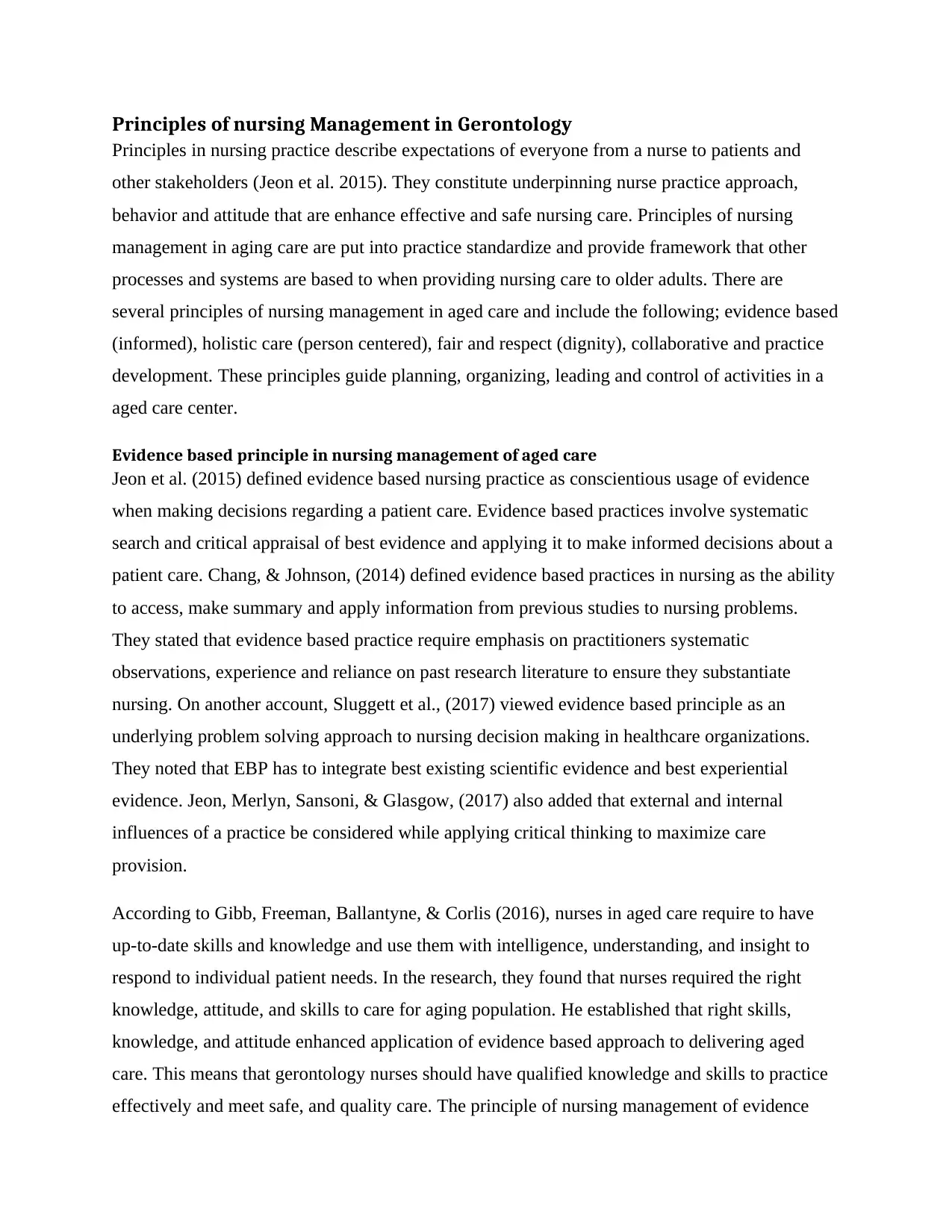
Principles of nursing Management in Gerontology
Principles in nursing practice describe expectations of everyone from a nurse to patients and
other stakeholders (Jeon et al. 2015). They constitute underpinning nurse practice approach,
behavior and attitude that are enhance effective and safe nursing care. Principles of nursing
management in aging care are put into practice standardize and provide framework that other
processes and systems are based to when providing nursing care to older adults. There are
several principles of nursing management in aged care and include the following; evidence based
(informed), holistic care (person centered), fair and respect (dignity), collaborative and practice
development. These principles guide planning, organizing, leading and control of activities in a
aged care center.
Evidence based principle in nursing management of aged care
Jeon et al. (2015) defined evidence based nursing practice as conscientious usage of evidence
when making decisions regarding a patient care. Evidence based practices involve systematic
search and critical appraisal of best evidence and applying it to make informed decisions about a
patient care. Chang, & Johnson, (2014) defined evidence based practices in nursing as the ability
to access, make summary and apply information from previous studies to nursing problems.
They stated that evidence based practice require emphasis on practitioners systematic
observations, experience and reliance on past research literature to ensure they substantiate
nursing. On another account, Sluggett et al., (2017) viewed evidence based principle as an
underlying problem solving approach to nursing decision making in healthcare organizations.
They noted that EBP has to integrate best existing scientific evidence and best experiential
evidence. Jeon, Merlyn, Sansoni, & Glasgow, (2017) also added that external and internal
influences of a practice be considered while applying critical thinking to maximize care
provision.
According to Gibb, Freeman, Ballantyne, & Corlis (2016), nurses in aged care require to have
up-to-date skills and knowledge and use them with intelligence, understanding, and insight to
respond to individual patient needs. In the research, they found that nurses required the right
knowledge, attitude, and skills to care for aging population. He established that right skills,
knowledge, and attitude enhanced application of evidence based approach to delivering aged
care. This means that gerontology nurses should have qualified knowledge and skills to practice
effectively and meet safe, and quality care. The principle of nursing management of evidence
Principles in nursing practice describe expectations of everyone from a nurse to patients and
other stakeholders (Jeon et al. 2015). They constitute underpinning nurse practice approach,
behavior and attitude that are enhance effective and safe nursing care. Principles of nursing
management in aging care are put into practice standardize and provide framework that other
processes and systems are based to when providing nursing care to older adults. There are
several principles of nursing management in aged care and include the following; evidence based
(informed), holistic care (person centered), fair and respect (dignity), collaborative and practice
development. These principles guide planning, organizing, leading and control of activities in a
aged care center.
Evidence based principle in nursing management of aged care
Jeon et al. (2015) defined evidence based nursing practice as conscientious usage of evidence
when making decisions regarding a patient care. Evidence based practices involve systematic
search and critical appraisal of best evidence and applying it to make informed decisions about a
patient care. Chang, & Johnson, (2014) defined evidence based practices in nursing as the ability
to access, make summary and apply information from previous studies to nursing problems.
They stated that evidence based practice require emphasis on practitioners systematic
observations, experience and reliance on past research literature to ensure they substantiate
nursing. On another account, Sluggett et al., (2017) viewed evidence based principle as an
underlying problem solving approach to nursing decision making in healthcare organizations.
They noted that EBP has to integrate best existing scientific evidence and best experiential
evidence. Jeon, Merlyn, Sansoni, & Glasgow, (2017) also added that external and internal
influences of a practice be considered while applying critical thinking to maximize care
provision.
According to Gibb, Freeman, Ballantyne, & Corlis (2016), nurses in aged care require to have
up-to-date skills and knowledge and use them with intelligence, understanding, and insight to
respond to individual patient needs. In the research, they found that nurses required the right
knowledge, attitude, and skills to care for aging population. He established that right skills,
knowledge, and attitude enhanced application of evidence based approach to delivering aged
care. This means that gerontology nurses should have qualified knowledge and skills to practice
effectively and meet safe, and quality care. The principle of nursing management of evidence
Paraphrase This Document
Need a fresh take? Get an instant paraphrase of this document with our AI Paraphraser
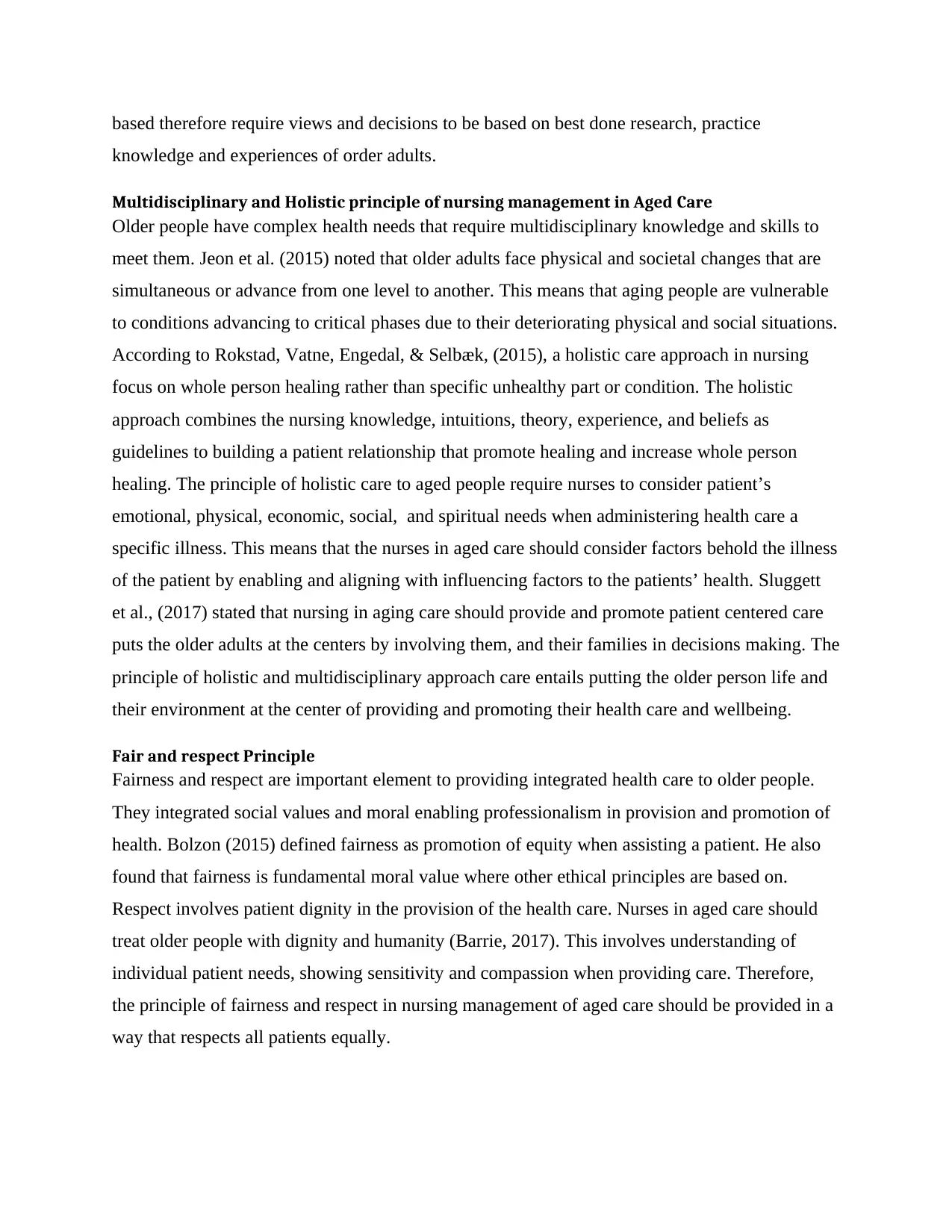
based therefore require views and decisions to be based on best done research, practice
knowledge and experiences of order adults.
Multidisciplinary and Holistic principle of nursing management in Aged Care
Older people have complex health needs that require multidisciplinary knowledge and skills to
meet them. Jeon et al. (2015) noted that older adults face physical and societal changes that are
simultaneous or advance from one level to another. This means that aging people are vulnerable
to conditions advancing to critical phases due to their deteriorating physical and social situations.
According to Rokstad, Vatne, Engedal, & Selbæk, (2015), a holistic care approach in nursing
focus on whole person healing rather than specific unhealthy part or condition. The holistic
approach combines the nursing knowledge, intuitions, theory, experience, and beliefs as
guidelines to building a patient relationship that promote healing and increase whole person
healing. The principle of holistic care to aged people require nurses to consider patient’s
emotional, physical, economic, social, and spiritual needs when administering health care a
specific illness. This means that the nurses in aged care should consider factors behold the illness
of the patient by enabling and aligning with influencing factors to the patients’ health. Sluggett
et al., (2017) stated that nursing in aging care should provide and promote patient centered care
puts the older adults at the centers by involving them, and their families in decisions making. The
principle of holistic and multidisciplinary approach care entails putting the older person life and
their environment at the center of providing and promoting their health care and wellbeing.
Fair and respect Principle
Fairness and respect are important element to providing integrated health care to older people.
They integrated social values and moral enabling professionalism in provision and promotion of
health. Bolzon (2015) defined fairness as promotion of equity when assisting a patient. He also
found that fairness is fundamental moral value where other ethical principles are based on.
Respect involves patient dignity in the provision of the health care. Nurses in aged care should
treat older people with dignity and humanity (Barrie, 2017). This involves understanding of
individual patient needs, showing sensitivity and compassion when providing care. Therefore,
the principle of fairness and respect in nursing management of aged care should be provided in a
way that respects all patients equally.
knowledge and experiences of order adults.
Multidisciplinary and Holistic principle of nursing management in Aged Care
Older people have complex health needs that require multidisciplinary knowledge and skills to
meet them. Jeon et al. (2015) noted that older adults face physical and societal changes that are
simultaneous or advance from one level to another. This means that aging people are vulnerable
to conditions advancing to critical phases due to their deteriorating physical and social situations.
According to Rokstad, Vatne, Engedal, & Selbæk, (2015), a holistic care approach in nursing
focus on whole person healing rather than specific unhealthy part or condition. The holistic
approach combines the nursing knowledge, intuitions, theory, experience, and beliefs as
guidelines to building a patient relationship that promote healing and increase whole person
healing. The principle of holistic care to aged people require nurses to consider patient’s
emotional, physical, economic, social, and spiritual needs when administering health care a
specific illness. This means that the nurses in aged care should consider factors behold the illness
of the patient by enabling and aligning with influencing factors to the patients’ health. Sluggett
et al., (2017) stated that nursing in aging care should provide and promote patient centered care
puts the older adults at the centers by involving them, and their families in decisions making. The
principle of holistic and multidisciplinary approach care entails putting the older person life and
their environment at the center of providing and promoting their health care and wellbeing.
Fair and respect Principle
Fairness and respect are important element to providing integrated health care to older people.
They integrated social values and moral enabling professionalism in provision and promotion of
health. Bolzon (2015) defined fairness as promotion of equity when assisting a patient. He also
found that fairness is fundamental moral value where other ethical principles are based on.
Respect involves patient dignity in the provision of the health care. Nurses in aged care should
treat older people with dignity and humanity (Barrie, 2017). This involves understanding of
individual patient needs, showing sensitivity and compassion when providing care. Therefore,
the principle of fairness and respect in nursing management of aged care should be provided in a
way that respects all patients equally.
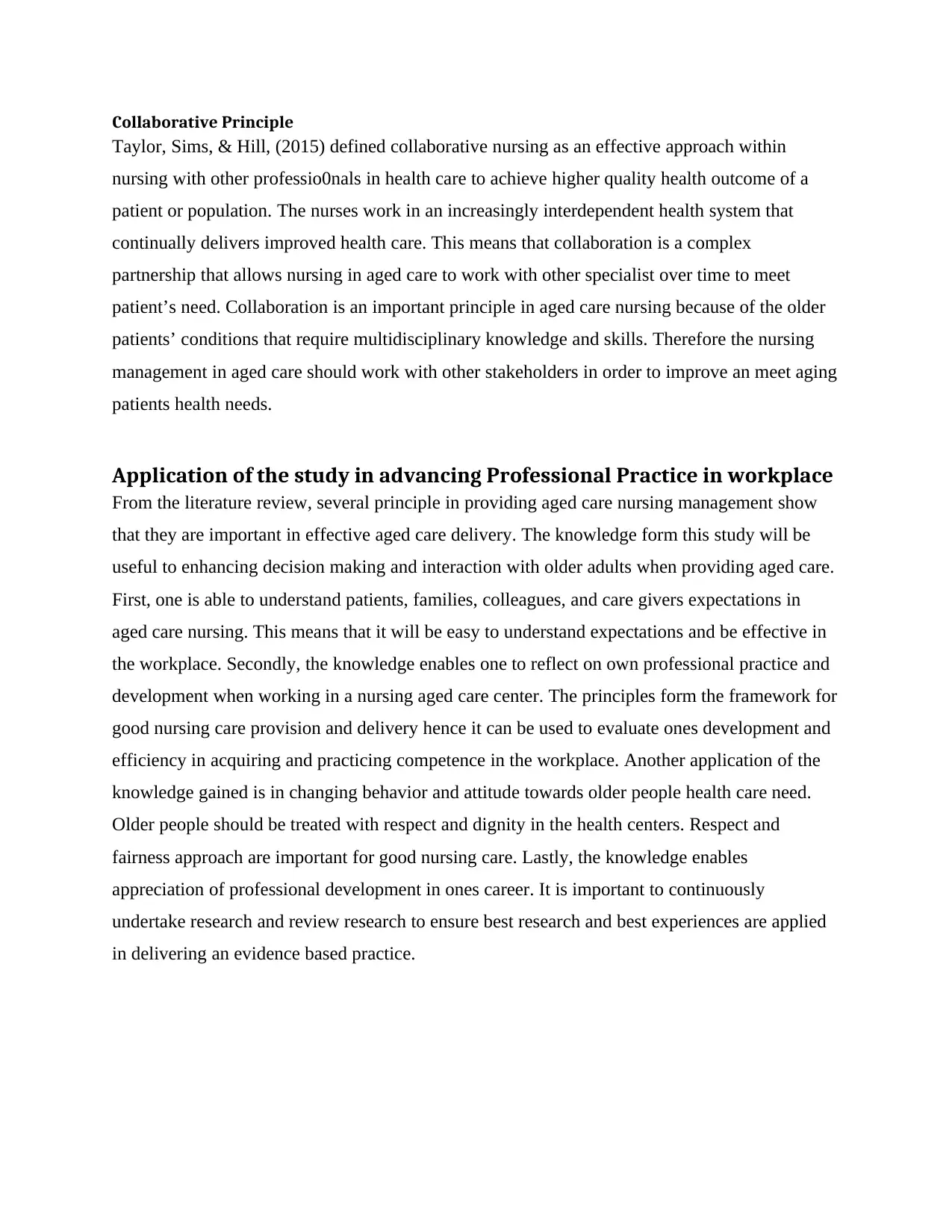
Collaborative Principle
Taylor, Sims, & Hill, (2015) defined collaborative nursing as an effective approach within
nursing with other professio0nals in health care to achieve higher quality health outcome of a
patient or population. The nurses work in an increasingly interdependent health system that
continually delivers improved health care. This means that collaboration is a complex
partnership that allows nursing in aged care to work with other specialist over time to meet
patient’s need. Collaboration is an important principle in aged care nursing because of the older
patients’ conditions that require multidisciplinary knowledge and skills. Therefore the nursing
management in aged care should work with other stakeholders in order to improve an meet aging
patients health needs.
Application of the study in advancing Professional Practice in workplace
From the literature review, several principle in providing aged care nursing management show
that they are important in effective aged care delivery. The knowledge form this study will be
useful to enhancing decision making and interaction with older adults when providing aged care.
First, one is able to understand patients, families, colleagues, and care givers expectations in
aged care nursing. This means that it will be easy to understand expectations and be effective in
the workplace. Secondly, the knowledge enables one to reflect on own professional practice and
development when working in a nursing aged care center. The principles form the framework for
good nursing care provision and delivery hence it can be used to evaluate ones development and
efficiency in acquiring and practicing competence in the workplace. Another application of the
knowledge gained is in changing behavior and attitude towards older people health care need.
Older people should be treated with respect and dignity in the health centers. Respect and
fairness approach are important for good nursing care. Lastly, the knowledge enables
appreciation of professional development in ones career. It is important to continuously
undertake research and review research to ensure best research and best experiences are applied
in delivering an evidence based practice.
Taylor, Sims, & Hill, (2015) defined collaborative nursing as an effective approach within
nursing with other professio0nals in health care to achieve higher quality health outcome of a
patient or population. The nurses work in an increasingly interdependent health system that
continually delivers improved health care. This means that collaboration is a complex
partnership that allows nursing in aged care to work with other specialist over time to meet
patient’s need. Collaboration is an important principle in aged care nursing because of the older
patients’ conditions that require multidisciplinary knowledge and skills. Therefore the nursing
management in aged care should work with other stakeholders in order to improve an meet aging
patients health needs.
Application of the study in advancing Professional Practice in workplace
From the literature review, several principle in providing aged care nursing management show
that they are important in effective aged care delivery. The knowledge form this study will be
useful to enhancing decision making and interaction with older adults when providing aged care.
First, one is able to understand patients, families, colleagues, and care givers expectations in
aged care nursing. This means that it will be easy to understand expectations and be effective in
the workplace. Secondly, the knowledge enables one to reflect on own professional practice and
development when working in a nursing aged care center. The principles form the framework for
good nursing care provision and delivery hence it can be used to evaluate ones development and
efficiency in acquiring and practicing competence in the workplace. Another application of the
knowledge gained is in changing behavior and attitude towards older people health care need.
Older people should be treated with respect and dignity in the health centers. Respect and
fairness approach are important for good nursing care. Lastly, the knowledge enables
appreciation of professional development in ones career. It is important to continuously
undertake research and review research to ensure best research and best experiences are applied
in delivering an evidence based practice.
⊘ This is a preview!⊘
Do you want full access?
Subscribe today to unlock all pages.

Trusted by 1+ million students worldwide
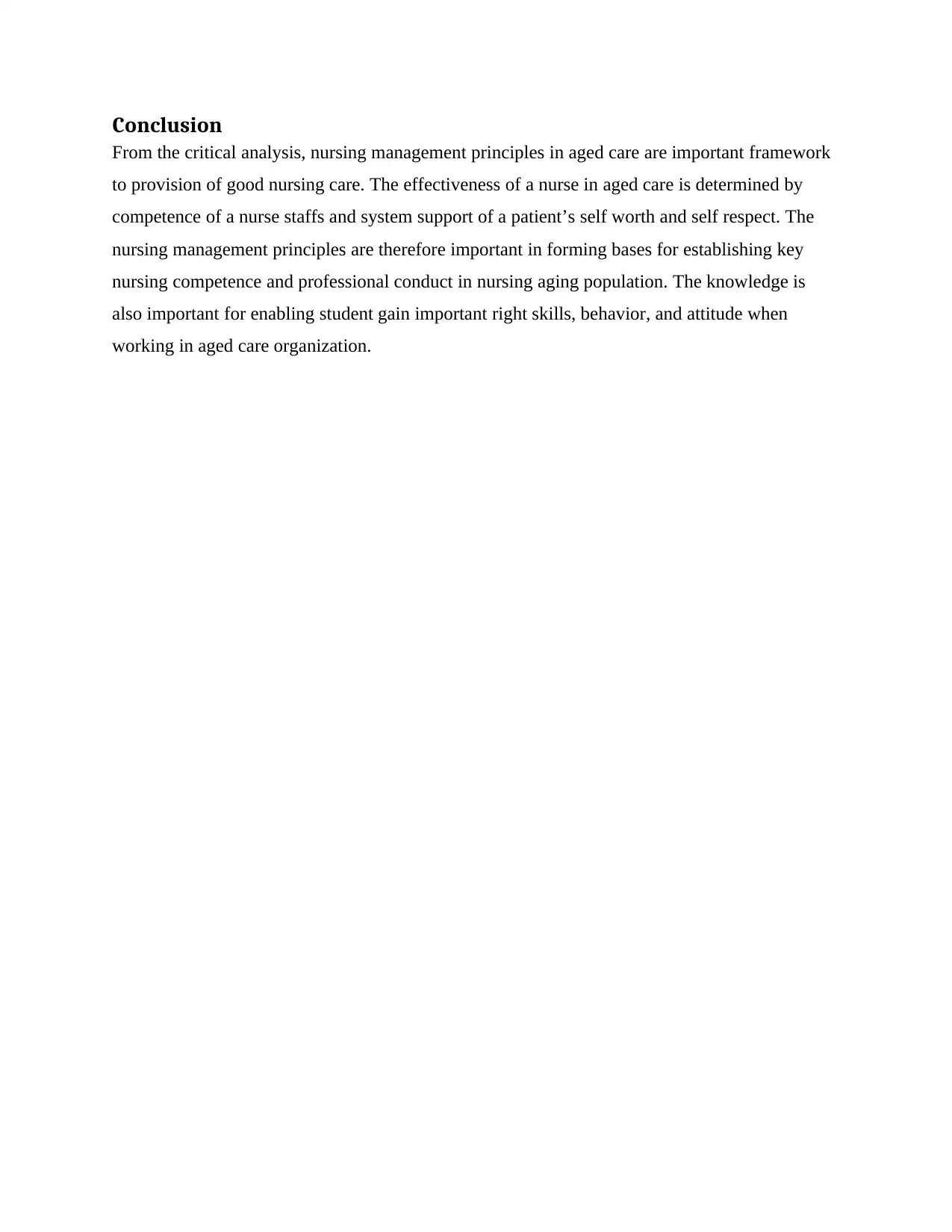
Conclusion
From the critical analysis, nursing management principles in aged care are important framework
to provision of good nursing care. The effectiveness of a nurse in aged care is determined by
competence of a nurse staffs and system support of a patient’s self worth and self respect. The
nursing management principles are therefore important in forming bases for establishing key
nursing competence and professional conduct in nursing aging population. The knowledge is
also important for enabling student gain important right skills, behavior, and attitude when
working in aged care organization.
From the critical analysis, nursing management principles in aged care are important framework
to provision of good nursing care. The effectiveness of a nurse in aged care is determined by
competence of a nurse staffs and system support of a patient’s self worth and self respect. The
nursing management principles are therefore important in forming bases for establishing key
nursing competence and professional conduct in nursing aging population. The knowledge is
also important for enabling student gain important right skills, behavior, and attitude when
working in aged care organization.
Paraphrase This Document
Need a fresh take? Get an instant paraphrase of this document with our AI Paraphraser
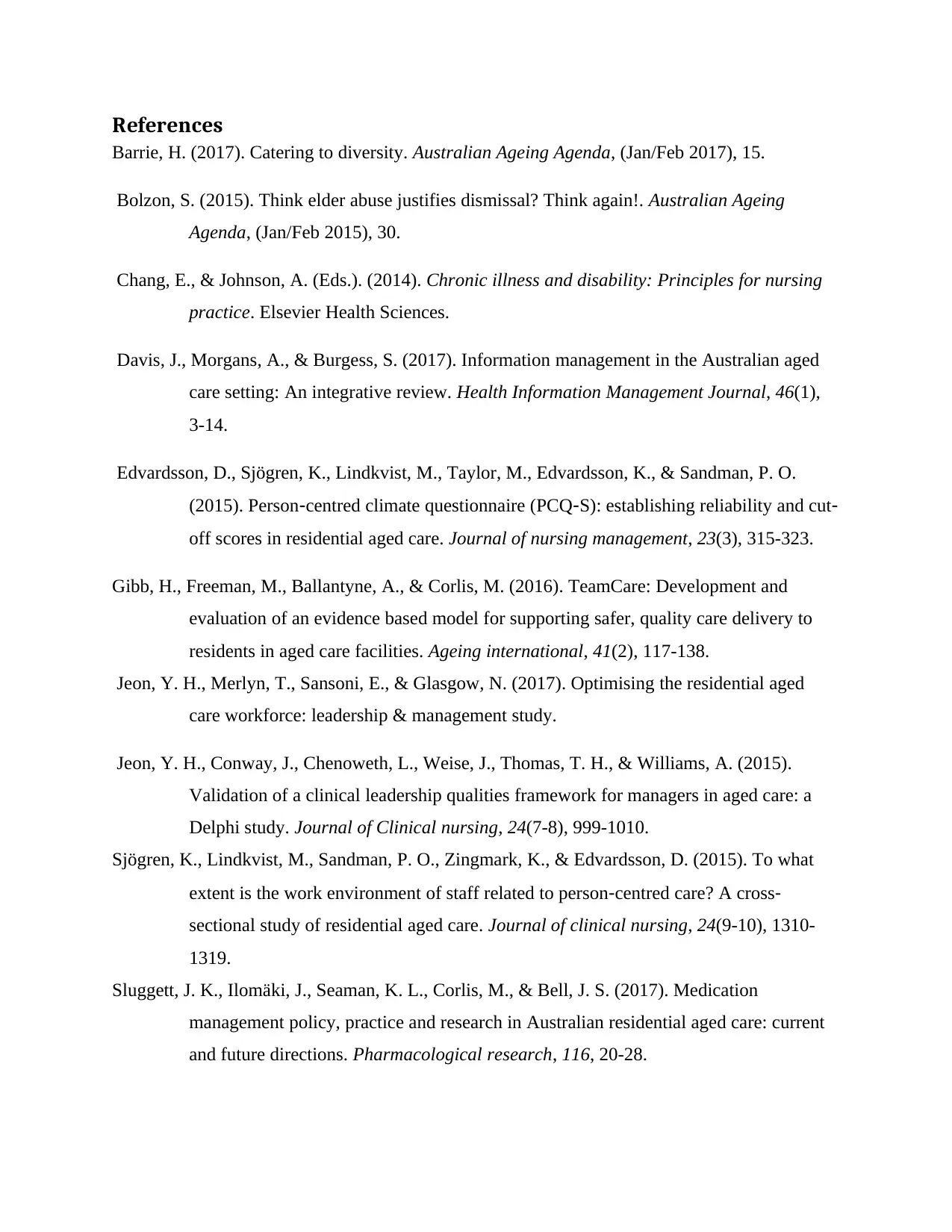
References
Barrie, H. (2017). Catering to diversity. Australian Ageing Agenda, (Jan/Feb 2017), 15.
Bolzon, S. (2015). Think elder abuse justifies dismissal? Think again!. Australian Ageing
Agenda, (Jan/Feb 2015), 30.
Chang, E., & Johnson, A. (Eds.). (2014). Chronic illness and disability: Principles for nursing
practice. Elsevier Health Sciences.
Davis, J., Morgans, A., & Burgess, S. (2017). Information management in the Australian aged
care setting: An integrative review. Health Information Management Journal, 46(1),
3-14.
Edvardsson, D., Sjögren, K., Lindkvist, M., Taylor, M., Edvardsson, K., & Sandman, P. O.
(2015). Person‐centred climate questionnaire (PCQ‐S): establishing reliability and cut‐
off scores in residential aged care. Journal of nursing management, 23(3), 315-323.
Gibb, H., Freeman, M., Ballantyne, A., & Corlis, M. (2016). TeamCare: Development and
evaluation of an evidence based model for supporting safer, quality care delivery to
residents in aged care facilities. Ageing international, 41(2), 117-138.
Jeon, Y. H., Merlyn, T., Sansoni, E., & Glasgow, N. (2017). Optimising the residential aged
care workforce: leadership & management study.
Jeon, Y. H., Conway, J., Chenoweth, L., Weise, J., Thomas, T. H., & Williams, A. (2015).
Validation of a clinical leadership qualities framework for managers in aged care: a
Delphi study. Journal of Clinical nursing, 24(7-8), 999-1010.
Sjögren, K., Lindkvist, M., Sandman, P. O., Zingmark, K., & Edvardsson, D. (2015). To what
extent is the work environment of staff related to person‐centred care? A cross‐
sectional study of residential aged care. Journal of clinical nursing, 24(9-10), 1310-
1319.
Sluggett, J. K., Ilomäki, J., Seaman, K. L., Corlis, M., & Bell, J. S. (2017). Medication
management policy, practice and research in Australian residential aged care: current
and future directions. Pharmacological research, 116, 20-28.
Barrie, H. (2017). Catering to diversity. Australian Ageing Agenda, (Jan/Feb 2017), 15.
Bolzon, S. (2015). Think elder abuse justifies dismissal? Think again!. Australian Ageing
Agenda, (Jan/Feb 2015), 30.
Chang, E., & Johnson, A. (Eds.). (2014). Chronic illness and disability: Principles for nursing
practice. Elsevier Health Sciences.
Davis, J., Morgans, A., & Burgess, S. (2017). Information management in the Australian aged
care setting: An integrative review. Health Information Management Journal, 46(1),
3-14.
Edvardsson, D., Sjögren, K., Lindkvist, M., Taylor, M., Edvardsson, K., & Sandman, P. O.
(2015). Person‐centred climate questionnaire (PCQ‐S): establishing reliability and cut‐
off scores in residential aged care. Journal of nursing management, 23(3), 315-323.
Gibb, H., Freeman, M., Ballantyne, A., & Corlis, M. (2016). TeamCare: Development and
evaluation of an evidence based model for supporting safer, quality care delivery to
residents in aged care facilities. Ageing international, 41(2), 117-138.
Jeon, Y. H., Merlyn, T., Sansoni, E., & Glasgow, N. (2017). Optimising the residential aged
care workforce: leadership & management study.
Jeon, Y. H., Conway, J., Chenoweth, L., Weise, J., Thomas, T. H., & Williams, A. (2015).
Validation of a clinical leadership qualities framework for managers in aged care: a
Delphi study. Journal of Clinical nursing, 24(7-8), 999-1010.
Sjögren, K., Lindkvist, M., Sandman, P. O., Zingmark, K., & Edvardsson, D. (2015). To what
extent is the work environment of staff related to person‐centred care? A cross‐
sectional study of residential aged care. Journal of clinical nursing, 24(9-10), 1310-
1319.
Sluggett, J. K., Ilomäki, J., Seaman, K. L., Corlis, M., & Bell, J. S. (2017). Medication
management policy, practice and research in Australian residential aged care: current
and future directions. Pharmacological research, 116, 20-28.
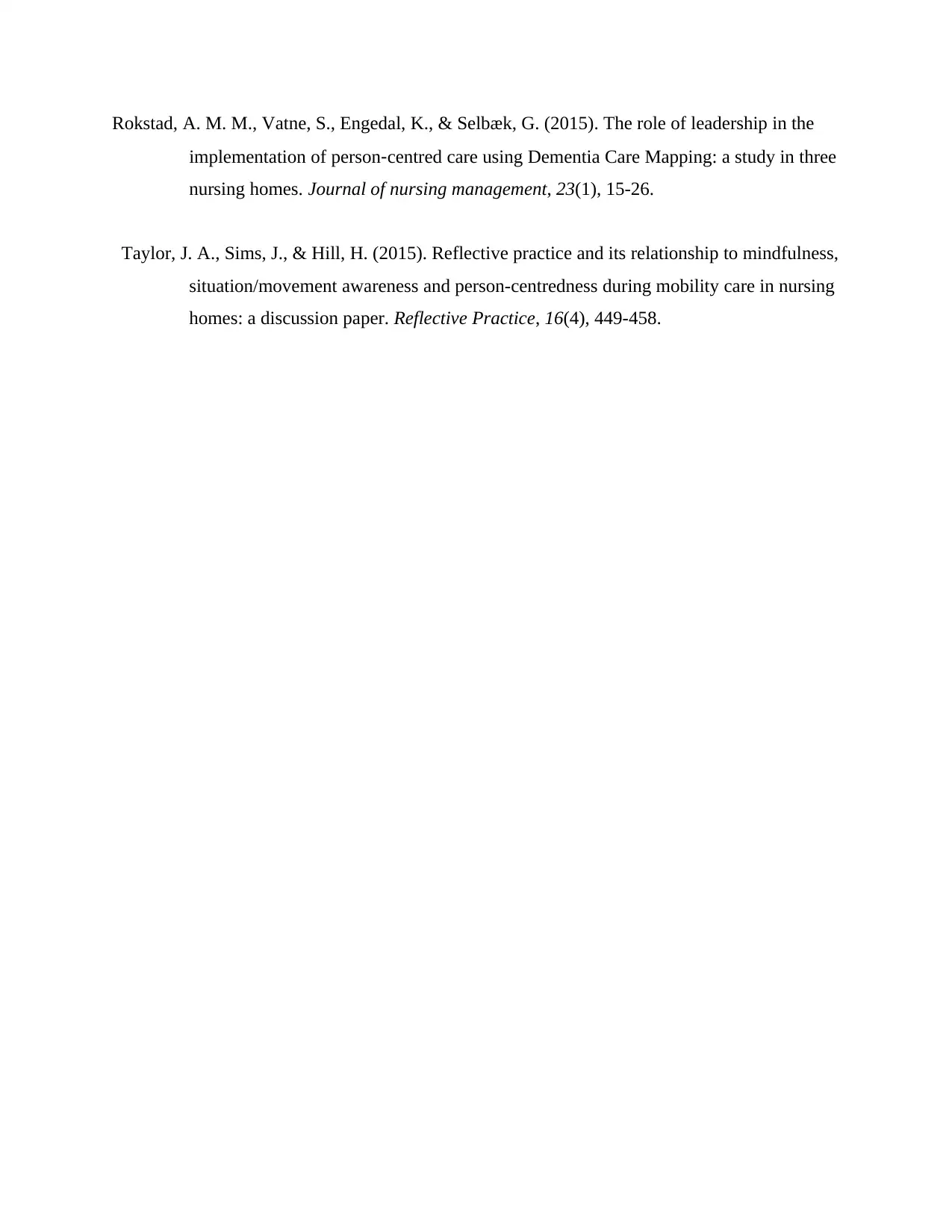
Rokstad, A. M. M., Vatne, S., Engedal, K., & Selbæk, G. (2015). The role of leadership in the
implementation of person‐centred care using Dementia Care Mapping: a study in three
nursing homes. Journal of nursing management, 23(1), 15-26.
Taylor, J. A., Sims, J., & Hill, H. (2015). Reflective practice and its relationship to mindfulness,
situation/movement awareness and person-centredness during mobility care in nursing
homes: a discussion paper. Reflective Practice, 16(4), 449-458.
implementation of person‐centred care using Dementia Care Mapping: a study in three
nursing homes. Journal of nursing management, 23(1), 15-26.
Taylor, J. A., Sims, J., & Hill, H. (2015). Reflective practice and its relationship to mindfulness,
situation/movement awareness and person-centredness during mobility care in nursing
homes: a discussion paper. Reflective Practice, 16(4), 449-458.
⊘ This is a preview!⊘
Do you want full access?
Subscribe today to unlock all pages.

Trusted by 1+ million students worldwide
1 out of 9
Related Documents
Your All-in-One AI-Powered Toolkit for Academic Success.
+13062052269
info@desklib.com
Available 24*7 on WhatsApp / Email
![[object Object]](/_next/static/media/star-bottom.7253800d.svg)
Unlock your academic potential
Copyright © 2020–2026 A2Z Services. All Rights Reserved. Developed and managed by ZUCOL.





